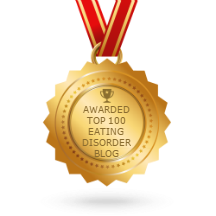- Home
- About
-
Services
- Therapy
-
Eating Disorder Trainings
>
- Clinical Approaches To Treating Body Image Issues
- Clinical Approaches To Treating Bulimia & Binge Eating Disorder
- Finding Freedom From Binge Eating
- Finding Freedom From Anorexia
- Supporting A Loved One With An Eating Disorder
- Eating Disorder Recovery Road Map
- Healing From Body Hate And Practicing Self-Compassion
- Common Questions
- Blog
- Press
- Contact
|
It’s so common that for people struggling with eating disorders there is often a sense of ambivalence. Often, part of them wants to hold onto the eating disorder, and another part of them desperately wants to be free from it. In terms of building your motivation to want to get help, or to continue to work on recovery, it can be important to look at what your eating disorder is keeping you from. Eating disorders steal people’s lives. Like an abusive partner, they promise to give you comfort and companionship. However, the reality is that they only provide short-term feelings of “comfort,” or “anxiety-relief,” with long-term feelings of misery and increased anxiety. As an eating disorder therapist in private practice, I work to help people to start to separate out their “eating disorder self,” from their “healthy self.” Together, we can empower the “healthy self” and find new ways of coping, rather than turning to eating disorder behaviors. Eating Disorder Values Vs. True Values One exercise to start getting clear on your “eating disorder” values vs. your “healthy self” values is to make a quick list of the things that your “eating disorder values.” For instance, your eating disorder may value things like, “thinness,” “having a sense of control,” or “numbing out emotions.” Next, it’s important to look at your true values. For instance, one way to start to look at this would be to ask yourself, “What do I want to be remembered for?” or “At the end of my life, I will feel that I have lived according to my values if..” Then, come up with a list of the things that are actually meaningful to you. For instance, maybe you value having meaningful relationships, family, and your career. What Is Your Eating Disorder Keeping You From? Lastly, I want you to get very clear on ways in which your eating disorder or body-shame might be keeping you from your actual values. For instance, often when someone is struggling with an eating disorder-it becomes their primary relationship and their other relationships start to suffer. Eating disorders also promise that they make you “unique and special,” however they actually turn you into a carbon copy of others who are struggling with the same illness. The reality is that they take away the traits and qualities that actually make you special, and replace them with an illness. You have so much more to offer the world than your disordered thoughts and behaviors. One way to examine this further is to make a list of what your life could look like 5 years from now if you are recovered from your eating disorder, vs. 5 years from now if you stay trapped in this illness. Self-Compassion It’s so important to be kind to yourself. It’s not your fault that you are struggling with an eating disorder. Eating disorders are mental illnesses, not something that anyone would choose to struggle with. No one would choose to feel intense anxiety at the thought of eating at a restaurant, to binge eat until they feel sick and ashamed, to be caught in the exhausting cycle of bingeing and purging, to suffer from health complications. It’s not your fault and it’s not a choice, however you can make the brave choice to work on recovery from this. Ultimately, looking at your “life values” can help you to recognize that doing the work to heal your relationship to food and your body, will have a big pay-off. I don’t know about you, but at the end of my life-I don’t think that people will be reminiscing and sharing that they remember me fondly for my size ___ jeans or for my appearance. What I want to be remembered for is the kindness that I extended to others, the way that I pursue my passions, my relationships, and how I worked to advocate and treat those struggling with eating disorders and body shame. If your eating disorder is keeping you from your true values-I’d encourage you to take the first step towards seeking help. Seeking help when you are struggling is a sign of true strength, not weakness. You deserve a meaningful and joyful life. Jennifer Rollin, MSW, LCSW-C: is an eating disorder therapist in private practice in Rockville, Maryland. Jennifer specializes in helping teens and adults struggling with anorexia, binge eating disorder, and bulimia, and body image issues. Jennifer provides eating disorder therapy in Rockville, MD, easily accessible to individuals in Potomac, North Potomac, Bethesda, Olney, Germantown, Gaithersburg, and Washington D.C. Connect with Jennifer through her website: www.jenniferrollin.com
1 Comment
Marilyn Hochman
10/7/2017 01:43:49 pm
What an empowering message. Thank you.
Reply
Leave a Reply. |
About MeI'm an eating disorder therapist in private practice in Rockville, MD. Archives
June 2024
|


 RSS Feed
RSS Feed
